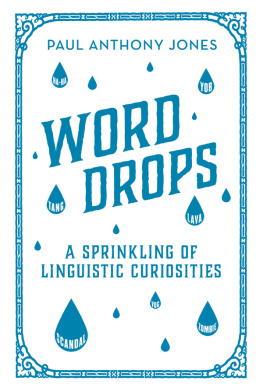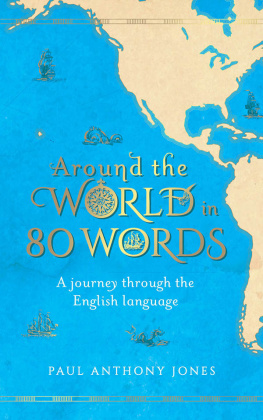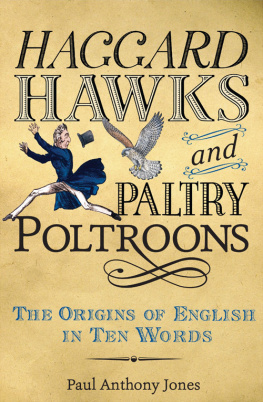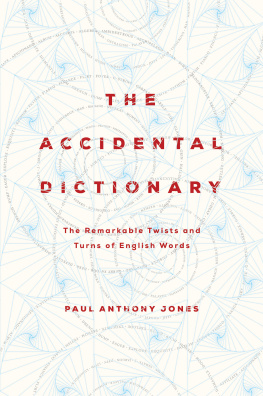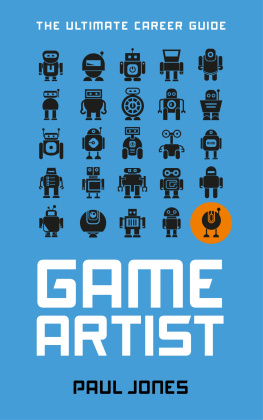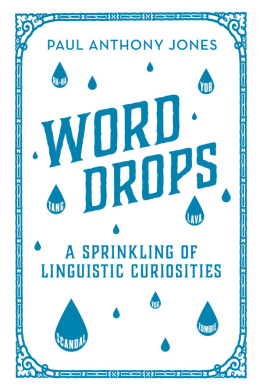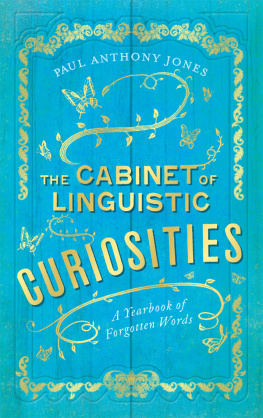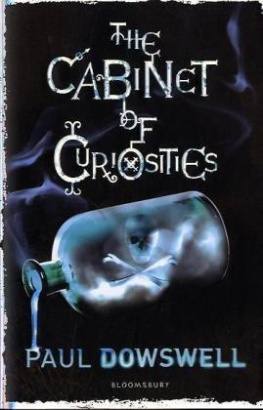Paul Anthony Jones - Word Drops: A Sprinkling of Linguistic Curiosities
Here you can read online Paul Anthony Jones - Word Drops: A Sprinkling of Linguistic Curiosities full text of the book (entire story) in english for free. Download pdf and epub, get meaning, cover and reviews about this ebook. year: 2015, publisher: Perseus Books, LLC, genre: Home and family. Description of the work, (preface) as well as reviews are available. Best literature library LitArk.com created for fans of good reading and offers a wide selection of genres:
Romance novel
Science fiction
Adventure
Detective
Science
History
Home and family
Prose
Art
Politics
Computer
Non-fiction
Religion
Business
Children
Humor
Choose a favorite category and find really read worthwhile books. Enjoy immersion in the world of imagination, feel the emotions of the characters or learn something new for yourself, make an fascinating discovery.
- Book:Word Drops: A Sprinkling of Linguistic Curiosities
- Author:
- Publisher:Perseus Books, LLC
- Genre:
- Year:2015
- Rating:3 / 5
- Favourites:Add to favourites
- Your mark:
- 60
- 1
- 2
- 3
- 4
- 5
Word Drops: A Sprinkling of Linguistic Curiosities: summary, description and annotation
We offer to read an annotation, description, summary or preface (depends on what the author of the book "Word Drops: A Sprinkling of Linguistic Curiosities" wrote himself). If you haven't found the necessary information about the book — write in the comments, we will try to find it.
Word Drops: A Sprinkling of Linguistic Curiosities — read online for free the complete book (whole text) full work
Below is the text of the book, divided by pages. System saving the place of the last page read, allows you to conveniently read the book "Word Drops: A Sprinkling of Linguistic Curiosities" online for free, without having to search again every time where you left off. Put a bookmark, and you can go to the page where you finished reading at any time.
Font size:
Interval:
Bookmark:


First published 2015 by
Elliott and Thompson Limited
27 John Street
London WC1N 2BX
www.eandtbooks.com
epub: 978-1-78396-154-2
MOBI: 978-1-78396-155-9
Copyright Paul Anthony Jones 2015
All rights reserved. No part of this publication may be reproduced, stored in or introduced into a retrieval system, or transmitted, in any form, or by any means (electronic, mechanical, photocopying, recording or otherwise) without the prior written permission of the publisher. Any person who does any unauthorised act in relation to this publication may be liable to criminal prosecution and civil claims for damages.
A catalogue record for this book is available from the British Library.
Cover Design: Dan Mogford
For Matthew and Anthony
Tucked away alongside entries like logogram, logodaedalus (one who is cunning in words) and the considerably less pleasant but no less evocative logodiarrhoea (a flux or flow or words), the Oxford English Dictionary includes a brief entry dedicated to logofascinated an adjective, it explains, meaning fascinated by words. Only one record of its use in print is provided, taken from a relatively little-known work by the Scottish author and translator Sir Thomas Urquhart dating from 1652. As a noted logodaedalus Urquhart himself presumably coined the word, in which case he probably intended it to bear out the original and now long-lost seventeenth-century meaning of fascinated as a synonym of bewitched or enchanted. If youre logofascinated, ultimately, youre literally spellbound by language.
Whatever its history and connotations may be, however and despite its criminally infrequent use in print there is little denying that logofascinated is an absolutely superb word. It neatly sums up that inherent curiosity with words and language that leads to much eyebrow-raising and appreciative head-tilting whenever we stumble upon some new or remarkable word, or learn of some bizarre etymological quirk or tall tale. My own logofascination began as an eight-year-old, when I was given a fine-looking hardback dictionary for Christmas by my grandparents; by Boxing Day afternoon I had read it cover to cover, diligently devouring every page and dutifully taking note of any unfamiliar words encountered en route. Now, I openly admit that reading a dictionary cover to cover might not be everyones idea of a Christmas (or indeed any day) well spent and in retrospect, that level of nerdishly obsessive logofascination probably outsteps even Urquharts original definition but I can be consoled by the fact that, as a lover of language, I am by no means alone.
Two decades later, in December 2013, I set up a Twitter account called
In compiling these early bare bones of Word Drops, however, it soon became apparent that clutches of tweeted trivia seemed somehow to work or rather drop together. The fact that, for instance, the Jerusalem of Jerusalem artichoke is actually girasole, the Italian word for sunflower, appeared to sit perfectly beside the old French idiom avoir un cur dartichaut, to have a heart like an artichoke, which describes someone who seems fickly to fall in love with everyone they meet. And speaking of artichokes, in Scots they were once nicknamed worry-baldies, which tied in nicely with phalacrophobia, the fear of going bald. In turn, phalacrophobia derives from the same root as phalacrocorax, the Latin name for the cormorant, which literally means bald raven. And a group of cormorants is called a gulp, incidentally, which also means to swallow noisily as do slonk, frample and gamf. But the opposite of all of those is probably fletcherisation, which means chewing your food at least thirty times before swallowing. Ill stop there (you can see how that continues on page 168), but it was from word association chains just like these that Word Drops was born.
Before we begin in the only place it would really be right to let me take the opportunity to quickly but sincerely give thanks to all the followers of , without whom this project would likely never have come about. Thanks also to my agent, Andrew Lownie; to Jennie Condell, Pippa Crane and all at Elliott & Thompson; to my parents and expert proofreaders Leon and Maureen Jones; and to all of the centuries-spanning authors of the dictionaries and glossaries from which many of the most unlikely and unfamiliar of words listed here have been taken a select list of their wonderful works is provided here for reference.
Paul Anthony Jones
November 2014
_____________
Twitter lends itself brilliantly to trivia: the 140-character limit keeps facts brief yet digestible, succinct but no less informative. It can sometimes be just as frustrating, however, as some of the more intriguing words and trivia are obliged to stand alone while their equally fascinating back stories and explanations are left unsaid. Here in print though, this can be redressed: additional notes have been added throughout the book to fill in these blanks, providing welcome context, clarification and anecdotal evidence to bolster the bare facts.
[The aardvark is a peculiar African mammal whose equally peculiar double-A name has earned it its prestigious position as the first animal in the dictionary. Spare a thought, then, for its alphabetical next-door neighbours, the aardwolf and aasvogel, who are pipped into second and third place: the aardwolf (literally the earth-wolf) is a small striped hyena thats also known as the maanhaar, as if one set of double As wasnt enough, while the aasvogel (or carrion-bird) is another name for the Cape vulture, one of Africas largest birds of prey. All three creatures take their names from Afrikaans, a South African language that developed from Dutch in the early 1700s.]




[Behemoth derives from the Hebrew bhemoth, which appears in the Book of Job 40:1524 as the name of an enormous creature with bones ... as strong as pieces of brass that moveth his tail like a cedar. Jobs description is so ambiguous that the true identity of his behemoth remains a mystery, and in the past suggestions have ranged from an elephant to a water buffalo to a crocodile to (among some Young Earth Creationists, at least) a gigantic dinosaur. But given that we are told that the behemoth, lieth under the shady trees, in the covert of the reed and fens, where he eateth grass as an ox, and can draw up [the river] Jordan into his mouth, the most likely explanation is that hes a hippopotamus.]
Next pageFont size:
Interval:
Bookmark:
Similar books «Word Drops: A Sprinkling of Linguistic Curiosities»
Look at similar books to Word Drops: A Sprinkling of Linguistic Curiosities. We have selected literature similar in name and meaning in the hope of providing readers with more options to find new, interesting, not yet read works.
Discussion, reviews of the book Word Drops: A Sprinkling of Linguistic Curiosities and just readers' own opinions. Leave your comments, write what you think about the work, its meaning or the main characters. Specify what exactly you liked and what you didn't like, and why you think so.

